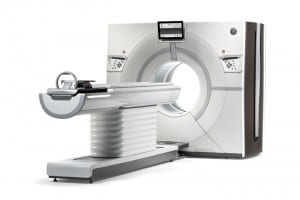
West Kendall Baptist Hospital in Miami has announced the purchase and installation of a highly advanced computed tomography (CT) scanner following a six-month evaluation at the hospital — the first clinical trial of the equipment in the United States.
With the convergence of whole-organ coverage, image quality, and speed found in GE Healthcare’s Revolution CT scanner, West Kendall Baptist Hospital physicians are now able to diagnose even the most challenging patients.
This innovative technology can enable clinicians to diagnose more patients with erratic or high heartbeats and provide pediatric patients with sedation-free and low-dose scanning capabilities, among other clinical advances.
“The Revolution CT exceeded our expectations during the trial, and we are pleased to add this technology permanently to our comprehensive diagnostic imaging arsenal,” said Ricardo Cury, MD, chair of radiology and director of cardiac imaging at Baptist Health South Florida, who was the principal investigator of the study.
Today, more than 70 million CT scans are done each year in the United States, offering exceptional clinical value in helping physicians to provide a fast and definitive diagnosis across a wide range of applications.
A CT scan is a noninvasive and expedient way to look inside the body at organs, soft tissues, vascular structures and bones using X-rays to generate very high-resolution images of the body. It does this by rotating an X-ray source and detector around the patient as the patient is moved through the device.
The wide coverage of GE’s Revolution CT will allow West Kendall Baptist Hospital physicians to scan entire organs such as the brain, heart, liver and pancreas in a single, 0.28-second rotation, reducing breath-hold times for patients. In addition, the speed of the new technology allows providers to gather information about function as well as anatomy, enabling a comprehensive stroke assessment of the brain in a single exam.
“The design of the Revolution CT helps physicians to make highly confident diagnoses while providing patients a more comfortable, less intimidating experience during the procedure,” said West Kendall Baptist Hospital CEO Javier Hernández-Lichtl. “This investment speaks to our continued commitment to patient-and family-centered care.”
“This will be the first CT scanner that’s right for physicians in every clinical specialty and provides answers from one CT exam,” said Eric Stahre, president and CEO of GE Healthcare MICT. “Revolution CT is able to scan even the most challenging patients, day in and day out, with remarkably clear images. It can also scan pediatric patients at very low doses. And, we designed it for a productive, logical, and intuitive user experience.”
Revolution CT comes equipped with ASiR-V, GE’s next generation of low-dose technology, which may reduce the X-ray dose up to 82 percent with the same image quality. Furthermore, clinicians can help reduce patient anxiety with Revolution CT as:
• The scanner is 50 percent quieter than previous generation CT scanners.
• Revolution CT provides soft ambient lighting and personalized gantry displays.
• It can comfortably accommodate more patients with a larger 80 cm bore size.
• Due to the fast imaging speed, patients may not be required to take special medication to slow their heart rate for a diagnostic cardiac exam.
• Revolution CT may help reduce the amount of contrast media required. Revolution CT delivers high-definition imaging across the entire body, helping physicians make a confident diagnosis across all applications:
• Cardiac exams in a single heart beat;
• Whole-brain imaging in half-second;
• Low-dose, whole-organ diagnosis and follow-up for oncology patients;
• Detailed bone imaging, even for patients with metal implants, and
• Sedation-free and low-dose scans for pediatric patients. Revolution and ASiR-V are trademarks of General Electric Company.
In clinical practice, the use of ASiR-V may reduce CT patient dose depending on the clinical task, patient size, anatomical location and clinical practice. A consultation with a radiologist and a physician should be made to determine the appropriate dose to obtain diagnostic image quality for the particular clinical task.






